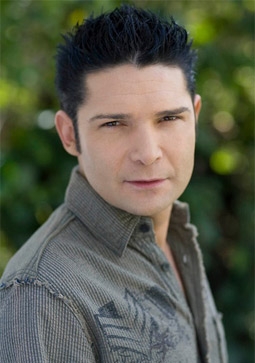
Corey Feldman’s show business career has been a veritable stew of circumstances and outcomes. Part Hollywood dream, part cautionary tale, and part triumph over adversity. He’s managed to re-invent himself into a spiritually focused, devoted family man who is serious about his craft, and passionate about charitable work.
Many people still hold Feldman’s darker, more rebellious incarnation in their frame of reference. His old image has been Feldman’s Achilles' heel throughout his adult life: a life that consists mainly of spending time with his wife Susie and son Zen, lending his support to causes close to his heart, and focusing on mainly independent films and his rock band, The Truth Movement. He claims that this is the person he has been for quite some time, but it has been largely ignored by the media, who is still attached to his troubled teenage past.
Another, more high profile, project which the media does seem to embrace is A&E’s reality series, The Two Coreys, in which Feldman confronts his love/hate sentiment toward Corey Haim, the other half of his sensationalized 1980s image. Corey Feldman appears to be at a time in his life where he is all about moving forward, yet interested in exploring and reconciling with his past. And like many entertainers who have ever experienced a period of media over-exposure, Feldman is a little self-conscious about his well documented adolescence.
Another vintage moment for Corey Feldman came in the form of a long overdue sequel to the 1987 classic cult film, The Lost Boys, set to be released this summer. In Lost Boys: The Tribe, Feldman and Haim reprise two of the roles that cemented their joint notoriety.
Corey Feldman spent much of our conversation lamenting his convoluted reputation and eagerly trying to express what he feels is a much clearer picture of how he sees himself. “I’m quite aware that I am not that important, and in the scheme of things quite insignificant. The world has much bigger concerns currently, than celebrity,” he insists with a humility which appears to be a defining characteristic. Unlike many celebrities, he wants you to know that he doesn’t feel special, and somehow, it doesn’t come off as contrived. He puts considerable time where his mouth is, by throwing himself into worthy causes like People for the Ethical Treatment of Animals (PETA), The Humane Society, Green Peace and The Amie Karen Cancer Fund. Feldman does believe in the power of a positive voice, amidst a sea of negative oratory, and he feels that his is as worthy as any other. “If I can lend a voice for positive change, then I have served my purpose.”
Deep self-musings aside, we also had some laughs, compared notes on the law of attraction and weighed the pros and cons of teen stardom and the fallout from fame.
PR.com (Allison Kugel): Tell me about your group, The Truth Movement. I didn’t even know you were a musician?
Corey Feldman: I don’t know if I would actually claim to be a musician. That’s a pretty big assessment (laughs). I’m a singer-songwriter, and producer. I play a little bit as far as instrumentation goes, but it’s strictly leaving it to the professionals. I’ve been writing, singing, and producing for well over twenty years.
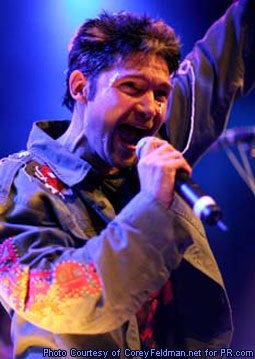
PR.com: Why is your band called Truth Movement, and what’s the style of music you’re recording right now?
Corey Feldman: It’s called Truth Movement because when we created the band we wanted to do something that was very much an homage to classic rock from the 60s and 70s. Part of thinking of the name was something that was fitting for that type of music. More importantly is the idea that everything we write about is honest and truthful, and something that should be explored further in consciousness. We wanted to do it in a way that it didn’t feel like just another band, but it felt like a collection of musicians coming together to kind of create a music for the time, and a philosophy and passage for people to reflect on. Through the music, we wanted to create more than just music, but a movement of people standing up for truth.
PR.com: And are you doing something with Pink Floyd?
Corey Feldman: Truth Movement is likened to Pink Floyd. A lot of the reviews that came out made a lot of comparisons to the sound of Pink Floyd, and we kind of threw it out there that we wanted to do classic rock, incorporating the sounds and the feelings and the raw nature of what they were doing at that time. As we’ve done our live stage shows and production, we’ve also incorporated some Pink Floyd cover songs. There’s always been this weird connection. I’ve always been a huge fan of Pink Floyd. I strive to one day reach that level of excellence. Through recent years I’ve been fortunate enough to have private time with each of the band members from Roger Waters to David Gilmour to Nick Mason, who I actually ended up playing some songs with about 4 or 5 months ago. One way or another we’ve ended up crossing paths and connecting. Through this weird series of events, I’ve also become friends with a lot of the side members of their band, and the guy who is responsible for doing all of their artwork for the last fifty years, Storm Thorgerson. I’m very fortunate to be able to say that Storm Thorgerson is doing our artwork. Storm is responsible for every Pink Floyd cover.
PR.com: Did you ever notice that when you think about something a lot and are attracted to something, you beckon it into your life? Like how you were saying, “We keep crossing paths.”
Corey Feldman: Yes, and that is a very powerful statement you just said. It’s actually Roger Waters who said it to me about two years ago. I was doing a play in New York called Fatal Attraction, a spin off of the movie. The reason I decided to take the gig and go do theatre was because I had heard that they were doing a stage production of The Wall. I wanted to play the lead character of Pink in the stage production for Broadway. I knew that there was no chance that I would get a shot at it without proving my own track record and being able to successfully do theatre and get an audience and reviews. So, I literally took the job for the chance to prove myself to Roger Waters, that I could play the part in [The Wall] once it was up and running. It turned out that Roger came to New York to premiere his opera, Ca Ira. I went backstage and presented him with a package of stuff which was basically reviews, a copy of my album, everything I’ve been doing. I said, “Listen, the reason I’m in New York and I’ve been doing this show right now is so that I can get a shot at doing The Wall, because it’s my dream and I believe that it’s meant for me to do.” He took the package and was quite gracious and said, “Well, believing is the most powerful thing that we have.” And I said, “Yes it is.” Since that time I’ve had the opportunity to sit down with him a couple times. He actually invited me to dinner after his Dark Side of the Moon show at The Hollywood Bowl last year. I’ve always had this very powerful gift, which is that I can visualize things and bring them into my life. I think I did it when I was a kid, with Michael Jackson. I had this dream that I would become friends with him one day. Somehow through a course of events, we became very close as I’m sure you’re aware. The same thing has happened with The Beatles, Pink Floyd and with actors who I really appreciate or look up to.
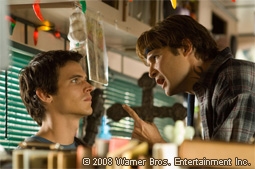
PR.com: You’ve effectively changed your image from the time you were a teenager…
Corey Feldman: (Laughs) I’m glad you think so.
PR.com: (Laughs) Well, you’ve managed to overcome some of the bad press from your adolescence. There’s been a lot of press about you being spiritual, about you being an animal rights activist, an environmental activist… being on a better path and having a family, and so on. Are you hoping that will lead to you being back to where you were in the heyday of your career… at some point?
Corey Feldman: That’s a many wielded sword that you just threw at me because there’s so many different answers and outlets to the question you pose. I don’t think that I’m purposely doing anything to change an image, or to reconfigure the way people think of me. I think that I’m simply living my life as I always have, which is hopefully in a positive direction. If you really look at my history, before I had my drug problems I was out campaigning for Nancy Reagan’s “Just Say No” [campaign]. I was also at the forefront of working with animals rights and I was a vegetarian since I was 12 or 13 years old. I’ve always been a spiritualist. I’ve always prayed and believed in God. Unfortunately, I hit a speed bump in my own personal path and went down a very dark road for a few years. Even though it really was a few years, people chose to kind of hang that on me as my door sign, saying “This is who he is. This is his box, and keep him in it.” It’s been a fight of good versus evil in my own personal life that one day I will rise above this soot that’s being thrown on top of me, and rise up from the ashes with my positive message, and show people this is who I’ve been all along.
PR.com: I think because a child star gone wrong makes a juicier story.
Corey Feldman: Exactly. But unfortunately that’s the temperature of our society. Everybody’s always looking for the gossip, but they’re not looking for the real answer or the real solution. To me it’s so much more appealing, because there’s so much negativity out there and there’s so much degradation out there. It’s so much more appealing to hear a positive story, or somebody that’s got something to share with us that we can use as an inspiration. All I’ve tried to do since the time that I got sober is leave a positive message and try and help people through their own struggles, where I needed help getting through mine.
PR.com: What’s the perspective of a child star? When you’re a young kid are you aware of the money you’re making? Are you aware of the fact that you’re famous, or even what being famous means when you’re a child?
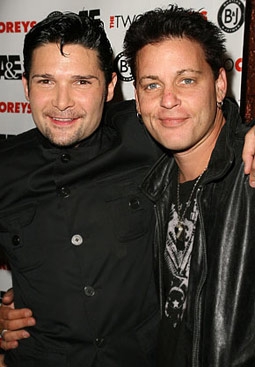
Corey Feldman: I always say I was famous before I knew my own name, which is true. When I was 4 and 5 years old I had people coming up and asking for my autograph, and I didn’t know what I was supposed to write. I wasn’t really aware of any of it, other than this is just my life and this is just what I do. As a kid I worked all the time. Before I knew it I became bigger and more well known. It was always kind of an escalating course that moved forward on a normally evolving level. I thought, “Ok, this is just the evolution. This is how things take their course.” I went with it until the point where I hit my speed bump, where everyone was trashing me and bashing me and saying what an awful, terrible person I was; bad boy this, and rebel that. I was like, “What are you talking about? None of this is me.” Yeah I had a drug problem and I had been at porn parties, so I can understand why you would hang that sign on me. But, at the same time, all those things are really incidental compared to the things that make me who I am.
PR.com: Did you ever have the notion of another career? Like, “Maybe if my parents didn’t put me in this, I would have been interested in a completely different path altogether.” Or are you actually glad that you wound up in this profession?
Corey Feldman: At the end of the day I don’t think that things happen by chance or by accident. I believe that there is a plan for all that we do and there is a purpose, and each person on this Earth has a purpose. So, I believe that I did have a purpose and I was supposed to do what I was supposed to do. Although there were many years of struggle and strife, eventually I had to persevere and I had to come out the other side with a positive outlook. I got to the point where I thought about giving up, and certainly with all the misconstrued images that have been out there of me and misguided information that’s been out there about me, people took me as a completely different person. It’s not just about the bad boy stuff or about being a drug addict. They also kind of hung this sign on me of being this immensely, overly self-important person. Everyone kind of categorized me as this guy who took himself far too seriously and saw himself as something more than he really was; kind of as a joke. What people don’t seem to understand is you’re a kid; you have a career; you’re famous. It’s not your fault. Now suddenly you’re famous, but everybody turns their back on you and you can’t just switch careers. All you can do is try to move forward with confidence.
PR.com: Tell me about your relationship with Corey Haim through the years. What film did you guys first meet on, and what’s been your relationship through the years? I know that at one point you had a falling out and didn’t speak for a while.
Corey Feldman: There’s been many of those points (laughs). It started with The Lost Boys. Joel Schumacher, the director, had hired both of us individually. I was told after I had gotten the job that Corey Haim was going to be playing the other lead character. I had heard his name through the press as an up and coming actor. He called me up one day and said, “Hey, it’s Corey Haim. I hear we’re shooting this movie together. Let’s get together and play football.” (Laughs) So Corey and I went down to Venice Beach with our fathers and we had a bit of a game of football. Whether it be coincidence or some master plan from the studio system, we ended up doing three films back to back. After doing three movies together and this whole “Coreymania” thing as they were calling it, and all the madness and teen stardom, we basically got labeled as the same person. When I started seeing the negative repercussions of that and seeing how dysfunctional his life and career was, coupled with the dysfunction I was going through at the time, I figured it was probably best for us to separate and have our own identities. Then we were asked to come back to do this movie called Blown Away in 1992. It was successful and fun and we had a great time working together again. Then we did two more [films]. We both noticed that the quality of the movies we were doing were swiftly going down hill. The final straw was when I directed a movie in 1995 called Busted. Corey was set to be the lead in the film. Based on the fact that he was in the midst of his massive drug problem at the time, he became inconsistent and incoherent, and unable to work on the film to the point where I had to threaten him and say, “If you don’t get your shit together, and you don’t show up when you’re supposed to, I’m going to have to fire you.” That was a very, very hard decision to make. Inevitably that’s what happened.
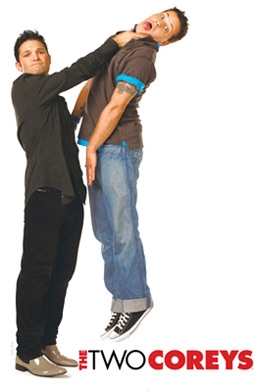
PR.com: All in all, did you cramp each other’s style, career wise? Did you think it was a great thing or a bad thing?
Corey Feldman: From a marketing standpoint it was genius, right? I had nothing to do with that, and I certainly can’t take any credit for that. Whatever it was that made it what it was, we did what we did together and I think that people still appreciate that work today, so it can’t be a negative. It’s got to be a positive because people enjoyed it. If you’ve given people enjoyment out of something that you’ve done, then that’s really what the purpose of the entertainment industry is, in the first place.
PR.com: How did you and Corey Haim get back together, and who pitched the show for The Two Coreys to the A&E Network?
Corey Feldman: Corey and I, even though we’ve had our hot and cold, we’ve always been like brothers. There’s a certain longevity in it all. No matter how bad things have gotten, there’s a positive to it which is that you’re closer than brothers. It’s like being blood, but your not blood. There’s this connection that’s there, that no matter what you do, you can’t seem to get away from it. That has been both a pro and a con in my life. Based on his erratic behavior and inconsistencies in his personal and professional life, and the fact that we both have the same name, there have been many times that I’ve lost opportunities because I was confused with him.
PR.com: Did you ever tell him that and hash that out with him?
Corey Feldman: I think we covered that on the first season of the show. We stayed friends through the years and I gave a lot of help in trying to get him sober. I got him into rehab several times, but we kept it very personal, and not professional. He was in very bad shape for many years to the point where I knew there was no chance of us working together anyway. We’d been pitched several ideas for TV series, movies… all sorts of things to try to get us back together. I’d always said, “No, no, no. Can’t do it.” Around the time we started developing The Two Coreys, we had been pitched an idea from another production company that was the same kind of structure as doing a reality show, but a scripted reality show. We ended up making a deal with RDF (a television production company) and constructing the new format which became the first season of The Two Coreys. So, we said “Ok, we’re going to do a scripted reality show that’s for entertainment purposes.” It’s like a sitcom. We wanted it to look and feel like a sitcom. We started production in Canada and we shot the first season. About half way through the first season, he started running into problems again.
PR.com: You say you shot the first season in Canada. It wasn’t actually in your home in Los Angeles?
Corey Feldman: No, not at all (laughs). Like I said, it was a scripted reality show. We were literally writing every episode. It was writing beats and writing jokes.
PR.com: Was it based in reality? Was it really based on the dynamic between you, your wife Susie and Corey Haim?
Corey Feldman: The storylines were all based on things that had really happened. So, it was grounded in reality somewhat. But, it was all set up and scripted, and all the beats were written. We were doing improv acting together, my wife included. So we’d say, “Ok, here’s the storyline, here’s the beats, here’s what’s gotta happen in this scene to get us to the next scene.” So, everything that you see in the first season is really acting, more than it is reality.
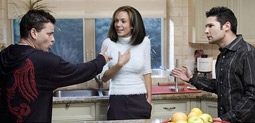
PR.com: And your son, Zen, was conspicuously absent from the first season of the show. Did you do that on purpose?
Corey Feldman: That was not my call actually. That was between the production company and the network. I never wanted Zen to be a part of the show. Susie and my feelings are that we want to keep him as far away from the entertainment business as possible; certainly until he’s old enough to make those decisions for himself. Our feeling was, obviously we’re mom and dad, and we’ve got to have him there with us. We’re going see him every night when we’re done working so we can have our family unit remain intact, and not change his schedule. The most important thing in a child’s development when you have a mom and dad who are working twelve hours a day, six days a week, is that there’s some consistency in their life and in their schedule. For us that consistency was being able to spend time with him every night when we were done shooting. We had our nanny there, and we had him there, at all times. That’s one of the most common things that’s asked of the first season. “Where was your kid?” He was always five feet away, and in arms reach between takes.
PR.com: I think it’s smart for him to never be in the public eye, and to never be on camera or in magazines. I think that’s definitely a good call.
Corey Feldman: For the most part the press has been very respectful about that, as well. There’s been maybe two times that he’s ended up on TMZ. But for the most part he’s been very shielded and very protected, and we’ve been very consistent with that. This season we do the exact same things, except we shot in L.A., and again we had the nanny and Zen on the set at all times. There is one shot at the beginning of the first episode where I talk about my family and they show the back of [Zen’s] head, kind of running off into another room. That’s the only time he’ll make an appearance at all, and you never see his face.
PR.com: What’s the overall theme for the second season of The Two Coreys? How is it different from the first season?
Corey Feldman: It’s one hundred percent different. Basically it’s apples and oranges. Last year was a show for entertainment purposes, and 70% scripted. This year I’d say maybe it’s 10% to 15% scripted, only in the sense of setting up the situations to some extent, such as going to see a therapist. Obviously we didn’t just go pick a therapist out of the phonebook. We had to find a therapist that was willing to be on television, and we had to write it into the storyline.
PR.com: But this season is more real, and there’s more genuine interaction?
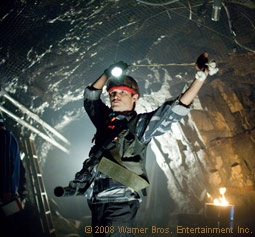
Corey Feldman: It’s one hundred percent real and authentic. And everything that happened, happened as it did. It’s not scripted. The things that you see are, in my estimation, some of the most shocking, jaw dropping, controversial things I’ve ever seen on television.
PR.com: How is Corey Haim doing? Is he still sober?
Corey Feldman: Well (laughs)… I think you’re going to have to watch the show to find out the answer for that one. I will say that all will be revealed. This season kind of blows the roof off of the first season, and says everything that you thought you learned last season, forget. Here’s what’s really going on. It basically shows you the dynamic of why Corey and I can’t be partners, can’t be friends and can’t move forward with a career together. The second season is the most honest television that any celebrity-type has ever done.
PR.com: How did the Lost Boys sequel (Lost Boys: The Tribe) come about after twenty years? Is it the original team that did the first movie?
Corey Feldman: Not at all. It was something that had been talked about for years and years. Originally it was going to be done by Richard Donner and Joel Schumacher who did the original. As things progressed, it never got made the way that it was supposed to. Then it came back around as a direct to DVD movie that they were going to do for a very low budget. I declined to be a part of it because I wasn’t happy with the script or the way things were going. I didn’t want to be a part of a trashy remake of a great movie. Then they came back to me from Warner Bros. and said, “We have a new script. We’ve listened to your thoughts, and we’ve written in a part for Corey Haim. We’re increasing the budget and we’re going to give it a shot at theatrical [release]. We’re going to try and actually make it a real movie.” At that point I said, “Ok let’s give it a shot.” I also was quite impressed by the director, P.J. Pesce’s, dedication to connecting the two films and preserving the feel and the vibe of the first film. I know that’s what’s most important to fans.
PR.com: Are you happy with the finished product?
Corey Feldman: I’m proud of it. I think it’s a good movie. Do I think that they could have done a bigger, grander production? Of course. You could have done a hundred million dollars. You could have done Richard Donner and Joel Schumacher, and all of the cast members that were still alive from the first one. You could have done it that way and it certainly would have been fun to do. That said, with what they were working with and what it started out as, to what it became, I think that they’ve done a very good job. I think that the fans will be very pleased. It certainly is a definite sequel to Lost Boys. They did a great bit of back story, connecting the dots between the first and the second, through the comic book series which was released through DC Comics. It tells the story of what happens to me and my brother between the two films.
PR.com: And the movie is going straight to DVD. Disappointed?
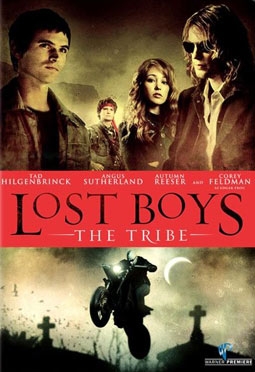
Corey Feldman: I think any artist will be disappointed when they can’t reach the full potential [for] the work they’ve done. That’s the politics of the movie business. I don’t try to worry myself with that. All I do is show up and perform, do the best job that I can do, and hope that it gets the best possible outlet. Even though it is going straight to DVD, it’s also coming out on Blu-ray [Disc] and I believe that Warner Bros. is positioning this as a major campaign, even though it’s going straight to DVD. I think it’s going to be one of the most publicized and advertised straight to DVD movies in history.
PR.com: The trailer looks great.
Corey Feldman: The fan support for this [movie] all along has been mind blowing. The day that I premiered the trailer on MTV, within 24 hours they got half a million views on that trailer, which was more at the time then The Incredible Hulk and Indiana Jones, which both premiered trailers the same day. People were interested and wanted to see it. That’s gone as far as petitions and websites that people have created, and fan videos and all this stuff, to try to get it a theatrical release. I think there was a great level of disappointment about the fact that the studio decided not to take the risk. But, in watching the film, and this is completely honest, I feel that it had the potential and it certainly warranted a theatrical release, regardless of what the decision was that was made. So, I think when people ultimately see the film, in whatever venue, they will be pleased with the outcome.
“Lost Boys: The Tribe” will be released on DVD and Blu-Ray on July 29th. View the trailer at lostboysthetribe.warnerbros.com.
“The Two Coreys” premieres June 22nd at 10:00PM ET/PT on A&E Network. Visit www.aetv.com/the-two-coreys.
